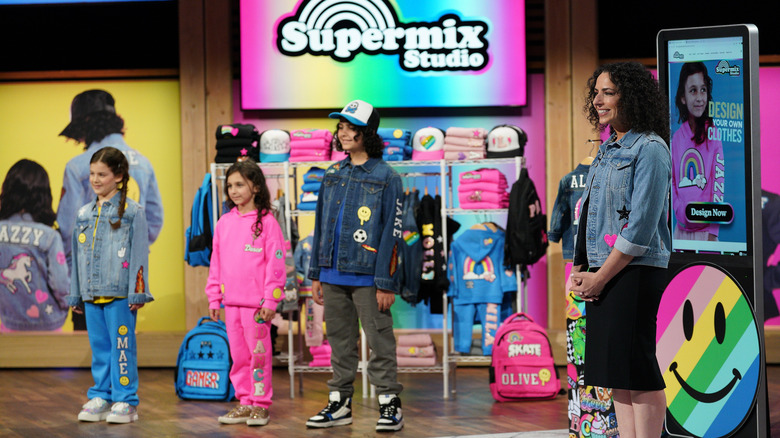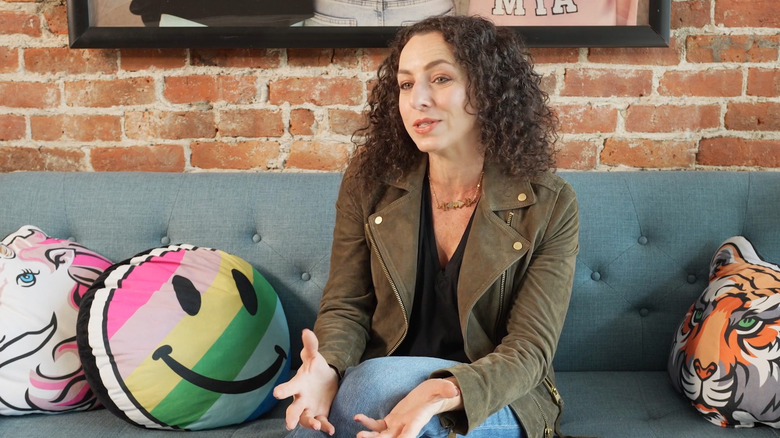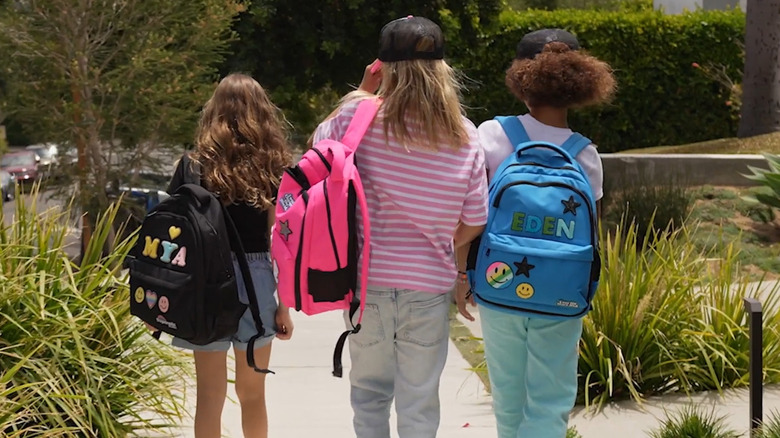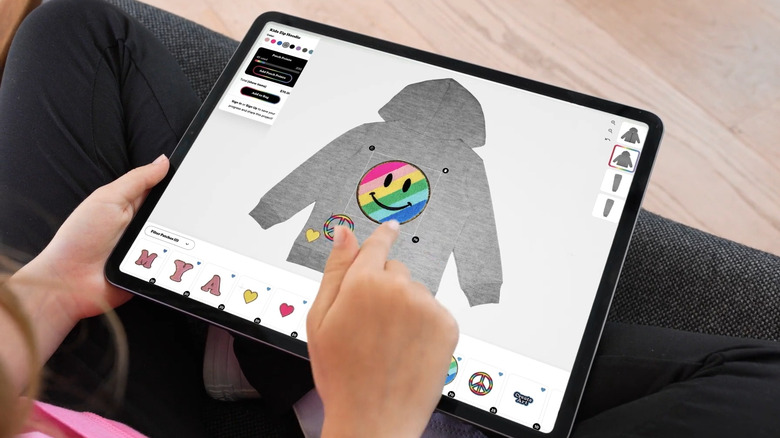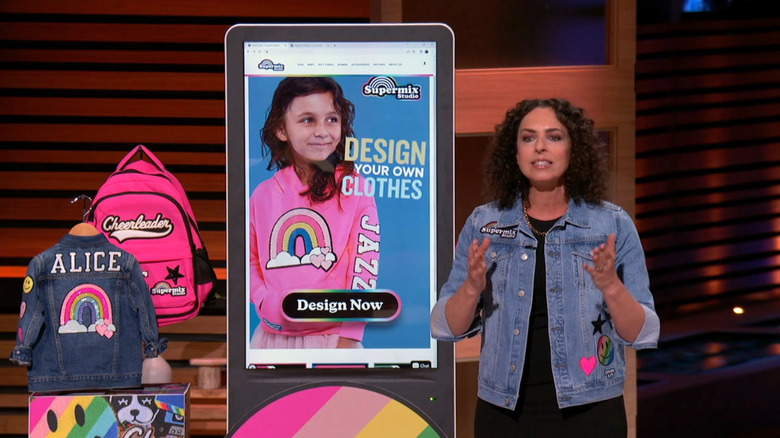3 Details About Supermix Studio From Shark Tank
It can be a struggle for parents to find something that their kids genuinely want to wear, so why not let them decide for themselves? Supermix Studio is looking to provide that for families with its customizable clothing line made especially for the young crowd.
The interactive service allows kids to choose between their choice of denim, backpacks, sweats, joggers, hats, and more. They can then customize their clothing with a variety of over 500 different patches, allowing the user to display their personality and interests in a big, bold fashion. The brand is all about individuality and spreading positivity with their patches celebrating such topics as pride, environmentalism, equality, and more. On top of that, Supermix is committed to remaining an eco-friendly company. Its backpacks are made from recycled polyester while all its cotton is made from BCI, the largest sustainable cotton source in the world. Similarly, all its packaging is made from recycled trash and printed with algae ink.
Kids aren't the only ones excited about Supermix Studio. The company will be featured on this Friday's episode of "Shark Tank" and may have a chance of walking away with a life-changing investment from a shark. Let's take a look at some fun facts about Supermix.
Supermix's founder is no stranger to the fashion space
Supermix was founded by Jennifer Stein-Bischoff, who has had a lengthy history in the fashion world. Her first fashion collection, Jender, drew inspiration from her time in South Beach, Miami. Her style caught the attention of several artists and music groups, including the band Jane's Addiction, who she went on to dress for one of their tours. Afterward, she spent the next 20 years building a sizable career in New York, working in presidential and directorial positions for such major brands as Tommy Hilfiger, Aeropostale, Inc., American Rag, and Topsville.
As a child, Stein-Bischoff enjoyed customizing her own clothes in any way she could to express herself. This mindset drove her to create Supermix Studio, seeing the company as a great way for children to discover their own voices. "I think Supermix is going to make kids feel empowered," she said in a company video. "There's a really special, exciting connection to something when you make it yourself. And when you've chosen all of those patches that tell your story and then you get to put them exactly where you want them, you create something that's authentically meaningful."
Partnerships and praise are in abundance for Supermix
In Supermix Studio's efforts to spread positivity and individuality, the company has been looking to include others in its journey. Its official website contains a section with information about how other brands can turn their logos or artwork into custom patches. Additionally, the team creates landing pages that highlight the partnership and directs visitors to where they can buy. Some of their past collaborations include Dragonwing Girl, Zigazaoo, and the New Orleans Art Festival. Recently, they teamed up with the Florida-based toy company Fidget Toys Plus, a brand that has become especially popular on TikTok.
Reception to Supermix's lineup has been largely positive. Its website presents several reviews from pleased parents such as Armenia F. who shared, "Super mix studio offers this amazing experience for kids when it comes to designing. It gets them excited and brings out their creativity. We were so pleased with the experience and so in love with the final creation! The quality is over the top great! So many ways to style them, so yes we are in love! has begun to get them some notable recognition as of late." This praise has translated into official acclaim, including a win from the National Parenting Product Awards in September.
They are preparing to launch an Indiegogo campaign
As with most businesses preparing to go to "Shark Tank," Supermix Studio has been eagerly teasing its audience about the upcoming appearance on the show. There is certainly potential for the company to pique the sharks' interest given its unique service, dedication to sustainability, and its founders' proven success in the fashion industry. On top of that, Supermix seems prime for licensing opportunities with the potential to include such brands as Disney, Star Wars, Harry Potter, and Marvel amongst its catalog of original patch designs.
However, one clue might hint that Supermix Studio left the tank empty-handed. The company recently released an Indiegogo campaign that has yet to launch. With the campaign appearing so close to the company's appearance on "Shark Tank," it seems likely that it will kick off in earnest after Supermix Studio's segment has aired, as viewers of the hit ABC reality series are likely to flood the company's website and social media in a phenomenon known as the "Shark Tank" effect. It's entirely possible that the team is simply seeking additional funds, but it could also mean that they weren't able to secure an investment on the show and are banking on newcomers to pitch in. Fans won't know for sure until the episode airs, but nevertheless, Supermix Studio is bound to have a bright future ahead with or without a shark on board.
What happened to Supermix Studio on Shark Tank?
Jennifer Stein-Bischoff believes that Supermix Studio is a $2.5 million idea, but the "Shark Tank" isn't so sure.
Seeking $250,000 in exchange for 10%, Stein-Bischoff wants to invest a sizable amount of capital into a brand-new venture for the company. Though her online direct-to-consumer sales amount to just $170,000 (none of which is profit), she already wants to establish a brick-and-mortar retail presence via touchscreen kiosks, which can be placed in a children's store (such as Claire's) in exchange for a 30% revenue cut.
The retail push sparks mostly negative reactions from the tank of investors, who feel it is either premature or entirely unnecessary in 2023. Mark Cuban and Kevin O'Leary both go out because of this, with the latter joking that the entrepreneur had been infected with "Retail-19." Daymond John can potentially see the kiosk idea paying off, but the business mode is just too risky at present — he's out as well.
In the meantime, Lori Greiner and Robert Herjavec begin collaborating, eventually coming into the negotiations with a joint offer of $250,000 for 25% — plus a 5% royalty until they get their investment back. Mark remarks that it's a "bad deal," but is dismissed by the other investors. Even still, Stein-Bischoff counters the equity and royalty terms at 20% and 2% respectively. After Herjavec moves the royalty up to 3.5%, Stein-Bischoff accepts, leaving the "Shark Tank" with the third and final deal of the night.
